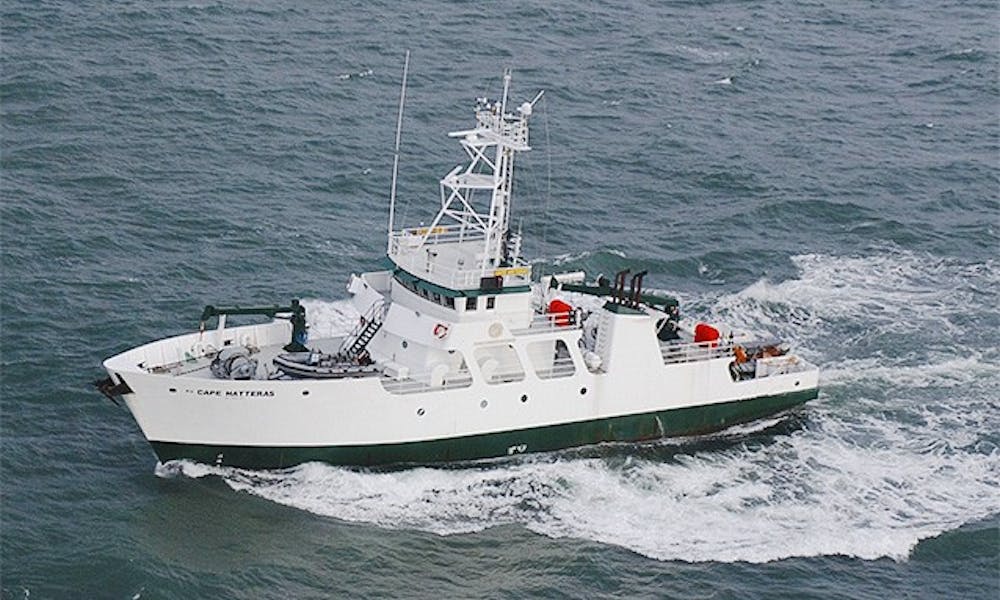As oil spreading through the Gulf of Mexico is reported on several beaches from Louisiana to Florida, it is still uncertain whether the spill will affect the East Coast.
Even if North Carolina beaches do not experience the effects of the incident, however, Duke students and professors are using the disaster as a research opportunity.
A British Petroleum oil rig located 50 miles off the Louisiana shore caught fire and exploded April 20, killing 11 platform workers. Two days later, the rig sunk and has been releasing thousands of barrels of oil every day into the water.
“If [North Carolinians] see oil, it will be a much smaller degree than what we are seeing in the Gulf Coast,” said Susan Lozier, professor of physical oceanography and chair of the Earth and Ocean Sciences division in the Nicholas School of the Environment. “Maybe we will see some filaments of oil, but it won’t be everywhere, coating the beaches.”
The oil could potentially move out of the gulf, enter the Florida Strait—which flows on the eastern side of the state—and then join the Gulf Stream, which carries water north, Lozier said. She added that, depending on the direction of the wind, water from the Gulf Stream does not usually reach the beaches.
Researchers from Duke and several other universities, including Texas A&M University and the University of California, Santa Barbara, are working to try to understand the potential damage of the oil spill.
The Cape Hatteras, a 135-foot oceangoing research vessel operated by the Duke and University of North Carolina Oceanographic Consortium, left the Duke Marine Lab in Beaufort, N.C. Saturday to spend 10 days in the gulf conducting research.
The studies, which are funded by the National Science Foundation’s Rapid Response program, will observe methane levels in the water and air to estimate how much oil is in the water and study whether the methane levels in the air could affect climate change, said Joseph Ustach, executive officer of the Hatteras. He added that researchers will collect and study data comparing sediment before and after the spill.
The ship will make an additional trip to the gulf later this summer, Ustach said.
There are certain hazards involved with conducting research close to the spill, however. Ustach noted that both the ship’s crew and the research teams participated in a daylong training session concerning contact with the hazardous material before setting sail.
On returning to Beaufort, the ship may stop at one of many cleaning stations set up since the spill. The oil will also contaminate some of the crew’s research equipment.
“The decision if the ship needs to be cleaned is up to the captain,” Ustach said. “[The crew] will be fined if they don’t [get cleaned] and they need it, but most likely they’ll stop at a station anyway.”
The Cape Hatteras has also been equipped with a webcam that will provide a live feed of what is going on in the gulf to the Nicholas School’s website dedicated to providing information about the gulf oil spill.
The website “Disaster in the Gulf,” which was officially launched May 28, features news articles, photos, links to other sites and several blogs, including “The Green Grok” by Bill Chameides, dean of the Nicholas School.
“When [the oil spill] happened, we were stunned and as it kept growing and growing, it was clear that we needed a response as one of the world’s premier environmental schools,” said Tim Lucas, national media relations and marketing specialist at the Nicholas School. “We wanted to provide a good source of information for people looking for experts, the latest news and images of the oil spill.”
Website content is written and organized by Nicholas School staff in addition to their normal academic duties. Headline news on the site comes from various news sources, including The Wall Street Journal, The New York Times and The Washington Post.
Lucas added that traffic on the site has been very heavy, with visits from students, alumni, reporters and others trying to stay updated on events in the gulf.
“[The oil spill] is pretty horrendous and the whole University is reacting,” Lucas said. “We want to provide the unbiased information and hopefully people will be able to get some use out of it.”
Get The Chronicle straight to your inbox
Signup for our weekly newsletter. Cancel at any time.

